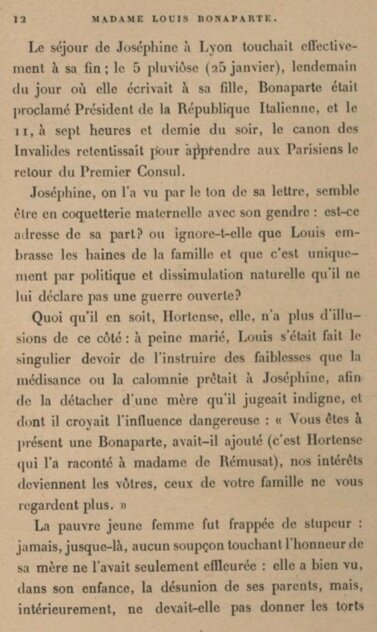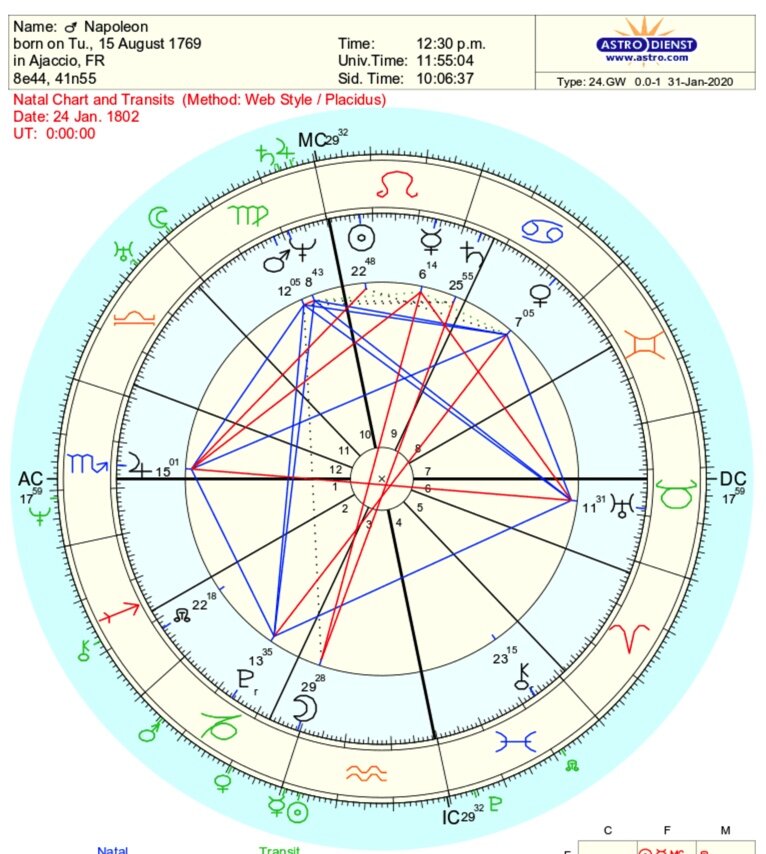The following letter from Josephine to her daughter Hortense is sourced from the French language book, Madame Louis Bonaparte by C. D’Arjuzon.
Some books about the topic of Napoleon are created to obscure the ugly behavior of the wealthy group that destroyed Napoleon’s life and some books are written to tell the truth. We’ll see which type of book this one happens to be.
One of the many mysteries of the Napoleon saga is the relationship between Josephine and her daughter Hortense. We all know women are famously prone to rivalry for whatever reason. Before his divorce, Napoleon was frequently seen in the company of both his wife and his stepdaughter. Since Napoleon wasn’t known as a one woman man, this grouping only reinforced that impression. This bizarre triangle is at the center of so much of this story.
I previously posted a letter from Josephine to Hortense where I felt their rivalry was in the foreground. The famously jealous Josephine was admitting that she did share Napoleon’s heart with Hortense.
Here I present Josephine’s letter to Hortense from around the time of Hortense’s sad marriage.
Hortense was very loyal to her mother despite the fact that her mother obliged her to marry a man she did not love, Louis Bonaparte. This was done in Josephine’s attempt to create an heir for Napoleon which might compel him to not divorce Josephine. According to Hortense’s memoirs, this idea originated with Napoleon.
The author of Madame Louis Bonaparte offers commentary which I’m including after the letter.
Dear Hortense,
Lyon, 4 Pluviose, Year X (January 24, 1802)
Finally, my dear Hortense, I see with pleasure the time when I can hug my dear daughter; when I see you I will forget all the sadness I experienced in this country. Our departure seems fixed on the 7th of this decade [the revolutionary calendar “week”], that is to say in three days.
I hope that no obstacle will stand in the way of Bonaparte's good resolution [to part].
I will tell you everything that happened during our stay in Lyon and tell you about the parties and entertainment that we were given, but there is no pleasure for your mother when you do not share it.
Kiss your husband for me, tell him that I am starting to love him madly, that I thank him for his little letters, that they are very kind.
Everyone is doing well here: Lemarrois is better, Rapp and Savary were sick, but they are doing well now, they all speak of you. Bourrienne particularly speaks about you.
Bonaparte kisses you, and your mother loves you tenderly.
JOSÉPHINE BONAPARTE.
Footnotes:
1. The letter, badly dated by the publishers, bears year XI for year X (1803 for 1802) year of the trip to Lyon, (Letters from Napoleon to Joséphine, volume II, Firmin-Didot, 1833.)
2. Aides-de-camp of the First Consul.
3. Secretary of the First Consul.
Author’s commentary:
Joséphine's stay in Lyon was coming to an end; on the 5th of Pluviose (January 25), the day after she wrote to her daughter, Bonaparte was proclaimed President of the Italian Republic, and on the 11th, at half past seven in the evening, the cannon of the Invalides resounded to announce the return of the First Consul to Paris.
Josephine, as we saw by the tone of her letter, seems to be in maternal coquetry with her son-in-law: is this sincere? Or does she ignore that Louis embraces the hatred of the Bonaparte family and that it is only through politics and natural concealment that he does not declare open war on the Beauharnais [Hortense and Josephine]?
Be that as it may, Hortense has no more illusions on her side: barely married, Louis had made it the singular duty to educate her of the gossip and slander about her [that Napoleon and Hortense were really lovers].
In order to detach Hortense from a mother whom Louis considered unworthy, and whose dangerous influence he feared, he told Hortense: "You are now a Bonaparte."
Louis added (it was Hortense who told this to Madame de Rémusat), our interests have become yours, those of your family no longer concern you. The poor young woman was struck with amazement.
La lettre suivante de Joséphine à sa fille Hortense provient du livre en français, Madame Louis Bonaparte de C. D'Arjuzon.
Certains livres sur le thème de Napoléon sont créés pour masquer le comportement laid du groupe riche qui a détruit la vie de Napoléon et certains livres sont écrits pour dire la vérité. Nous verrons quel type de livre celui-ci se trouve être.
L'un des nombreux mystères de la saga Napoléon est la relation entre Joséphine et sa fille Joséphine. Nous savons tous que les femmes sont réputées pour leur rivalité, quelle qu'en soit la raison.
Avant son divorce, Napoléon était fréquemment vu en compagnie de sa femme et de sa belle-fille. Nous savons tous que Napoléon n'était pas connu comme un homme d'une seule femme et ce regroupement n'a fait que renforcer cette impression.
Ce triangle bizarre est au centre d'une grande partie de cette histoire. J'ai déjà posté une lettre de Joséphine à Hortense où je sentais que leur rivalité était au premier plan. La célèbre jalouse Joséphine admettait qu'elle partageait le cœur de Napoléon avec Hortense.
Ici, je présente la lettre de Joséphine à Hortense datant de l’époque du triste mariage de Hortense. Hortense était très fidèle à sa mère malgré le fait que sa mère l'obligeait à épouser un homme qu'elle n'aimait pas, Louis Bonaparte.
Cela a été fait dans la tentative de Joséphine de créer un héritier pour Napoléon qui pourrait l'obliger à ne pas divorcer Joséphine. Selon les mémoires de Hortense, cette idée est née avec Napoléon. L’auteur de Madame Louis Bonaparte propose un commentaire que j’inclus après la lettre.
Let’s take a look at the planetary positions on the date of Josephine’s letter. Josephine sounds sad in this letter. Her first house of identity contains the Moon (emotion) and Pluto (darkness). Chiron (wounds) transits that house. To continue that theme of sadness Pluto transits natal Chiron in Josephine’s 3rd house of thinking and communication.
The Sun (spotlight) and Venus (money) transit Josephine’s 2nd house of money and values. Her husband has just taken command officially of Italy.
Jetons un œil aux positions planétaires à la date de la lettre de Joséphine. Joséphine a l'air triste dans cette lettre. Sa première maison d'identité contient la Lune (émotion) et Pluton (obscurité). Chiron (blessures) traverse cette maison. Pour continuer ce thème de la tristesse, Pluton transite Chiron natal dans la troisième maison de pensée et de communication de Joséphine. Le Soleil (projecteur) et Vénus (argent) transitent par la deuxième maison d'argent et de valeurs de Joséphine. Son mari vient de prendre officiellement le commandement de l'Italie.
Big successful Jupiter transits Napoleon’s midheaven as he takes on the rule of Italy. Pluto in Capricorn are present in Napoleon’s 2nd house of money and values. Napoleon is known for not collecting money or property for himself personally. His disinterestedness and hard work for money that he gave away was highly unusual. We could interpret transformative Pluto in Capricorn (hard work) in the 2nd house as a symbolic picture of this behavior. Mars (action) and Venus (money) transiting this house may show this behavior being fueled as Napoleon takes on more authority (Saturn) in Italy. The situation in Italy had brought him much war (Mars) and it would bring him even more.
Un grand succès Jupiter traverse le milieu du ciel de Napoléon alors qu'il prend le pouvoir de l'Italie. Pluton en Capricorne est présente dans la 2ème maison d'argent et de valeurs de Napoléon. Napoléon est connu pour ne pas collecter d'argent ou de biens pour lui-même. Son désintéressement et son travail acharné pour l'argent qu'il a donné étaient très inhabituels. Nous pourrions interpréter la transformation de Pluton en Capricorne (travail acharné) dans la 2e maison comme une image symbolique de ce comportement. Mars (carburant) et Vénus (argent) transitant par cette maison peuvent montrer que ce comportement est alimenté alors que Napoléon prend plus d'autorité (Saturne) en Italie. La situation en Italie lui avait apporté beaucoup de guerre (Mars) et cela lui apporterait encore plus.
Natal Saturn (constriction) is in Capricorn (Saturn) in Hortense’s 4th house of home and origins. This seems to allude to her domestic misery. Mars (abuse) is transiting this area. The transiting Sun (spotlight) is shining on Hortense’s afflicted stellium of Jupiter (amplification), Mars (abuse) and Pluto (darkness) in Hortense’s 5th house, the Sun ruled home of family pride. We see the affliction in the red lines between this planet group opposite the Moon (feelings) and square Venus (love) and the Sun (her very self).
Natal Saturne (constriction) est en Capricorne (Saturne) dans la 4ème maison de Hortense. Cela semble faire allusion à sa misère domestique. Mars (abus) traverse cette zone. Le Soleil en transit (projecteur) brille sur le stellium affligé de Hortense de Jupiter (amplification), Mars (abus) et Pluton (obscurité) dans la 5ème maison de Hortense, le Soleil régnait sur la fierté familiale. Nous voyons l'affliction dans les lignes rouges entre ce groupe de planète opposé à la Lune (sentiments) et à la Vénus carrée (amour) et au Soleil (elle-même).










